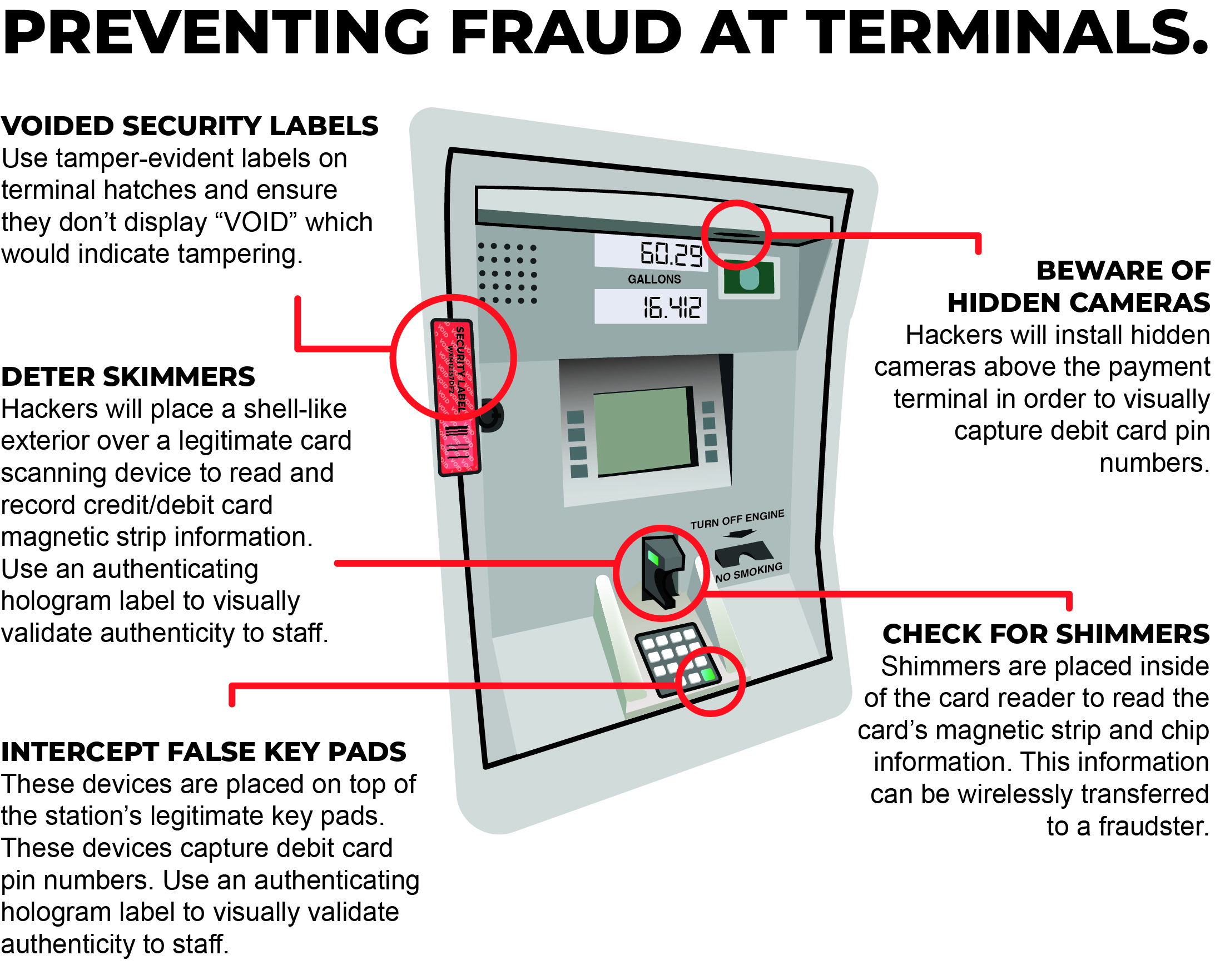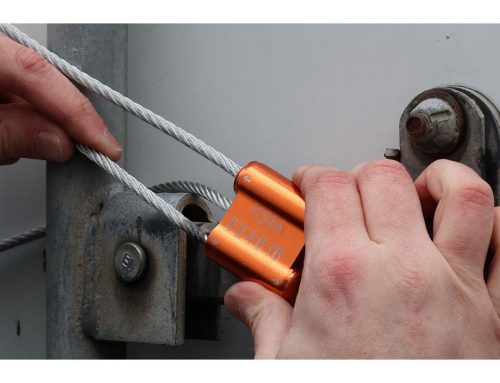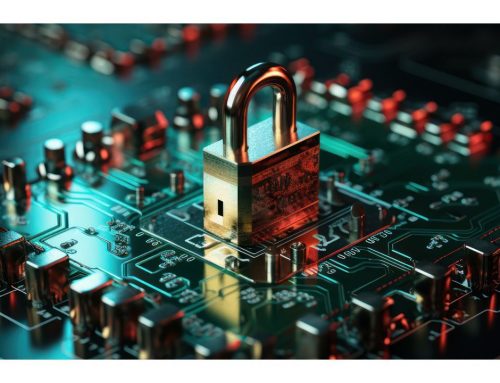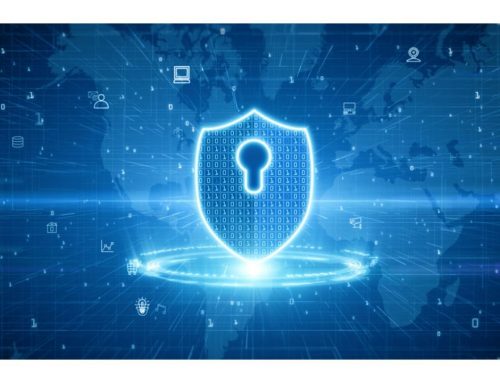Fuel Pump Security – A Phillips 66 Case Study
Fuel Pump Security – A Phillips 66 Case Study
The millions of fuel pumps across the globe have become obvious targets for thieves and hackers. Phillips 66 is fighting back.
1. The retail fuel industry faces billions in annual losses from fraud and theft, with gas pump skimming alone costing approximately $11 billion annually in the US
2. A comprehensive security approach requires multiple protective layers including physical measures, operational protocols, employee training, and technological solutions
3. The partnership between Phillips 66 and NovaVision demonstrates how physical security products can be effectively integrated with operational protocols to create a more robust system to combat theft and improve customer trust
Overview
The retail fuel industry faces significant challenges from sophisticated criminal activities, with skimming and fuel theft costing billions annually. Phillips 66, with approximately 7,500 branded sites across the United States, has implemented NovaVision’s specialized security labels and other anti-tampering products as part of a comprehensive security strategy to protect both their business interests and their customers’ financial information. This case study examines the partnership between Phillips 66 and NovaVision, highlighting how NovaVision’s security solutions help Phillips 66 combat fuel theft and payment fraud across its extensive network of retail gas stations.
The partnership demonstrates how a layered security approach combining physical tamper-evident products, strict operational protocols, and advanced authentication features can effectively deter criminal activity while maintaining operational efficiency. This case study includes industry research and commentary from John McIntosh, the Senior Fraud Investigator from Phillips 66. Together, they provide valuable insights for retail gas station owners and security professionals seeking to implement similar security measures to combat the evolving threats facing the industry.
The Retail Fuel Industry Security Landscape
The Scale of Fuel Theft and Fraud
The retail fuel industry faces a massive security challenge that continues to grow in both scale and sophistication. Skimming alone costs financial institutions and consumers more than $1 billion each year according to the FBI. An astonishing 15% of Americans report being victims of gas station skimming. When focusing specifically on gas pump skimming, the financial impact is even more staggering, with estimated costs upwards of $11 billion annually in the United States.
Recent data indicates that the problem is worsening. According to FICO, the first half of 2023 saw a 20% year-over-year increase in wide-scale card compromise events, jumping from 525 card compromise reports in 2022 to 625 in 2023. Even more concerning, the total number of cards impacted by these events increased by 77% year-over-year, from approximately 70,000 cards to nearly 120,000 cards in just six months.
The prevalence of these attacks is widespread, with approximately 15% of Americans reporting they have been victims of credit card skimming at gas pumps. This represents not only a significant financial burden but also damages customer trust and station reputation.
Evolution of Criminal Techniques
Criminals targeting gas stations have developed increasingly sophisticated methods over time. The FBI notes that “fuel pump skimmers are usually attached to the internal wiring of the machine and aren’t visible to the customer. The skimming devices store data to be downloaded or wirelessly transferred later.” This invisibility makes detection particularly challenging for both customers and station operators. The speed and efficiency with which criminals can install these devices is alarming. The FBI continues that “it only takes seconds to install a skimming device. Fraudsters may seek to distract store clerks—such as by requesting items from behind the counter—to accomplish this.”
Beyond traditional skimming, criminals have expanded their techniques to include more advanced methods:

1. Card Shimmers: While skimmers read magnetic stripe data, “shimmers fit into the chip reader of a credit card terminal, resting between the terminal and the card. These devices are as thin as paper and card-sized, making it possible for hackers to install them in the card slot. In contrast to skimmers, they capture both chip and magnetic stripe information.”
2. Wireless Technology: Modern skimming devices now have the capabilities to transmit data wirelessly to nearby devices, which allows criminals to collect card data without returning to the pump.
3. Fuel Theft Methods: Beyond payment fraud, direct fuel theft has become more sophisticated. Criminals access the inside of fuel pumps and tap into the valve coil to tap into the fuel tank.
4. Specialized Vehicles: Criminals use bladder trucks, which can be vans, trucks, or pickup trucks with illegal auxiliary fuel tanks mounted in the rear, covered for concealment. Diesel fuel makes up most of the fuel that is stolen. With the auxiliary fuel tanks, criminals can steal substantial amounts of fuel. Drivers of the bladder trucks, also known as “mules,” transport the stolen fuel back to their yards where they unload it into tanker trucks before selling the fuel. Long haul truckers, commercial trucking companies, and unscrupulous gas stations purchase the stolen fuel.

Phillips 66 Company Profile and Security Challenges
Phillips 66 maintains an extensive retail presence in the fuel industry, operating “a diverse marketing network with approximately 7,450 branded sites across the United States.” The company markets fuels through multiple channels, stating that “We market fuels through outlets that utilize Phillips 66, Conoco or 76 brands, as well as through unbranded channels. Phillips 66 Aviation is a top supplier of jet fuels and aviation gas to private, commercial and military aviation.”
Independent Operator Model and Security Implications
A significant aspect of Phillips 66’s business model is its reliance on independently owned and operated stations. According to the National Association of Convenience Stores (NACS), “Currently, around 55% of fuel-selling stores are single-store operators. Many of these businesses lack the resources to brand their stores independently from the fuel brand they sell and advertise on the canopy, which often results in the misconception that their business is owned and operated by a major oil company.”
This independent operator model creates unique security challenges for Phillips 66. While the company provides the brand identity and fuel supply, the responsibility for implementing and maintaining security measures often falls to individual station owners. This decentralized approach can lead to inconsistencies in security practices across the network.
The NACS further notes that “Major oil companies are reemerging on the retail landscape, reversing a decade-plus trend that reduced their share of the market to less than 0.5% by 2017. Shell Oil Co./Motiva Enterprises LLC, Chevron Corp., Exxon Mobil Corp., BP North America and ConocoPhillips/Phillips 66 collectively have more than 15,000 stores that are franchise operations.” This franchise model gives Phillips 66 some influence over security standards, but implementation still largely depends on individual operators.
Specific Security Vulnerabilities and Threats
Customers may not know their information has been stolen for hours or days after the event. Criminals may use the data to make online purchases or they may sell data online. When pumps are compromised, credit card customers may not know their information has been stolen until fraudulent charges appear on an account statement. This delayed discovery makes prevention particularly critical.
The company must also content with direct fuel theft, which can occur through sophisticated methods. U.S. Energy describes one such technique: “If the pump’s prestart is initiated, the suspect can dispense fuel freely by pulling the nozzle (if they power the valve with an external power source). If the pump’s prestart is disabled, the suspect simply must go to the other side of the dispenser, authorize the grade of gasoline that is powering the valve (which will activate the STP motor), and then they’ll be able to dispense fuel freely.” Industry data suggests that up to 1 in 5 gallons of fuel can be pilfered, often through sophisticated methods like ‘bladder trucks’ with hidden tanks. The financial impact on Phillips 66’s network could be substantial without effective security measures.
Implementation of NovaVision Solutions at Phillips 66
NovaVision has developed a specialized portfolio of security products designed specifically to address the unique challenges faced by retail gas stations. Phillips 66 has implemented NovaVision’s security products according to industry best practices for maximum effectiveness. The Federal Trade Commission recommends that gas stations “Use and track pump security seals. These large labels are adhered to the pump, near the credit card reader. If the pump panel is opened, the label will read ‘void,’ which means the machine has been tampered with.”
Their partnership includes:
1. Strategic Placement of Security Labels:
NovaVision’s non-residue security labels are proven-in-use as an effective tool to combat tampering at gasoline dispensers and credit card readers. When removed, the security label shows the words VOID OPEN in the label film. These labels are designed to provide tamper-evident protection by creating a unique residue pattern when removed.
2. Anti-Counterfeiting Features:
NovaVision’s security labels include two unique anti-counterfeiting features: 1) a printed watermark in the center of the label, which is visible with the naked eye and also fluoresces when exposed to black light, 2) Without removing the label, the hidden VOID OPENED pattern will fluoresce when exposed to black light.
3. Blocker Dots and Card Reader Bezels:
These devices physically obstruct the application of overlay skimmers on dispenser credit card readers or at a POS Terminal. The standard blocker dot is black polycarbonate plastic with a high strength adhesive. Each dot is laser etched with a unique pre-assigned serial number. Bezels can be placed around card readers to prevent the installation of overlay skimmers.
These products have been specifically engineered for the gas station environment, with NovaVision stating that their security labels for gasoline dispensers are proven-in-use in thousands of retail gas stations since 2007.
Supply Chain Security and Authentication Controls
NovaVision has implemented strict controls over its security products to prevent unauthorized access and counterfeiting. First, the company uses verified distribution by ensuring that specialty retail gas security labels are only shipped to validated retail locations or authorized distribution centers, helping prevent criminals from obtaining authentic labels. Second, NovaVision tracks and records the serial numbers shipped to each customer location. For added protection, they recommend incorporating serial number recording and verification into the replacement process, creating a closed-loop system for monitoring label authenticity. Finally, the company enforces rigorous customer verification protocols, confirming the legitimacy of gas station customers through validation of contact information and authorization status before any specialized security labels are sold.
These supply chain security measures are critical, as InstaKey notes that “While many gas stations now use pump tamper evident labels, they don’t solve the access problem. These labels can be easily purchased online by anyone and can be used to disguise fuel pumps as secure, when a credit card skimmer has actually been installed.” NovaVision’s strict controls help address this vulnerability.
The Phillips 66-NovaVision Partnership
Network-Wide Implementation Challenges and Solutions
Implementing consistent security measures across Phillips 66’s widespread network of independently operated stations presents unique challenges. To address these, the company has developed a comprehensive approach that combines standardized protocols, supply chain integrity, employee training, and controlled access. By establishing clear, easy-to-follow procedures for the use and inspection of security labels, Phillips 66 promotes uniformity across its diverse retail operations. In partnership with NovaVision, the company also maintains strict control over its supply chain, ensuring that specialty security labels are only distributed to verified retail locations or authorized distribution centers—safeguarding the system’s overall integrity.
A critical element of this strategy is frontline employee awareness. Phillips 66 emphasizes thorough staff training to help all personnel recognize and respond to potential fraud, particularly fuel pump tampering. Additionally, to further reduce vulnerabilities, the company enforces strict controls over who can order security materials. NovaVision verifies that each order comes from an approved buyer, preventing fraudulent attempts by bad actors seeking to obtain or replicate security labels. Together, these measures reflect Phillips 66’s commitment to layered security and its proactive stance in combating fuel fraud across its retail network.
Collaborative and Proactive Security
The relationship between Phillips 66 and NovaVision exemplifies a collaborative approach to security that extends beyond a typical vendor-client relationship. John McIntosh highlighted that NovaVision is “extremely customer-service oriented and very professional. Their response time is incredibly fast.”
This partnership is rooted in NovaVision’s deep expertise with the unique security challenges of retail gas stations, backed by proven performance in thousands of locations nationwide. Working closely with Phillips 66, NovaVision provides customized security solutions tailored to operational needs and brand standards, offers ongoing consultation on best practices and emerging threats, and collaborates directly to address and solve security challenges as they arise.
A key strength of the Phillips 66-NovaVision partnership is the implementation of proactive security protocols that help prevent fraud before it occurs. McIntosh has specifically praised NovaVision’s security procedures, noting that “They have highly secure protocols. There have been customers who tried ordering some of our labels, but NovaVision found they were not on the approved customer list and reached out to our P66 Fraud Department before any sale was made to confirm it was a legitimate P66 branded customer. That is important because thieves will try to purchase labels acting as customers. NovaVision will not sell to anyone who does not have the correct verifiable site information. Criminals sometimes do have counterfeit security labels that are very close in appearance to a legitimate label. When compared to an authentic label, the color is slightly off and they have a higher sheen. Counterfeit labels also will not have the same number sequence as the roll of legitimate security labels. There have been cases where unscrupulous employees have sold labels to skimmer thieves. NovaVision helps keep us secure at every checkpoint.”
The brands’ partnership has evolved to address emerging security threats in the retail fuel industry. As criminal techniques have become more sophisticated, the security solutions implemented by Phillips 66 have adapted accordingly.
This evolution reflects broader industry trends, as “The global tamper-evident packaging industry is set to expand significantly over the next decade, with its Industry size estimated to grow from USD 1,948.6 million in 2025 to USD 2,775.4 million by 2035, at a steady CAGR of 3.6%.” This growth is driven by “increasing consumer awareness about product safety and authenticity.”
This proactive approach includes a verified ordering system, serial number tracking, and authentication features. “NovaVision checks to confirm that our security labels are only shipped to validated retail locations or authorized distribution centers,” McIntosh explained. This prevents unauthorized access to authentic security products. NovaVision tracks and records the serial numbers shipped to each customer location, creating accountability and traceability throughout the supply chain. Finally, NovaVision’s security labels include two unique anti-counterfeiting features: 1) a printed watermark in the center of the label, which is visible with the naked eye and also fluoresces when exposed to black light, 2) Without removing the label, the hidden VOID OPENED pattern will fluoresce when exposed to black light. These features make verification simple while making counterfeiting difficult.
These protocols align with industry recommendations that emphasize the importance of using sequential serial numbers and logging the numbers during inspections. Criminals may try to use counterfeit security stickers, but employees can spot these easily if the serial numbers are not aligned or if the labels are miscolored.

Cost-Benefit Analysis
The implementation of NovaVision’s security solutions represents a cost-effective approach to fraud prevention for Phillips 66. While specific pricing details are not publicly available, the original request indicates that the cost is approximately “$111 for 1,000 labels lasting approximately 2 years per station.”
This investment provides significant value when compared to the potential costs of fraud:
1. Fraud Liability: Many industry experts estimate that potential chargebacks will exceed $201K per site in total over the next seven years for stations that have not implemented adequate security measures.
2. Operational Losses: With up to 1 in 5 gallons of fuel lost to fraud, the potential financial impact of inadequate security is substantial.
3. Reputational Damage: Beyond direct financial losses, fraud incidents can damage customer trust and station reputation, leading to lost business.
The implementation of NovaVision’s security labels aligns with industry recommendations for cost-effective security measures. BankInfoSecurity quotes an industry expert who recommends that operators “use security tape, to easily see if the enclosure has been tampered with; and we’re encouraging those who can’t afford to upgrade to rekey their dispensers. Those are the two lowest-hanging fruits.”
The long-term value of this investment is enhanced by the durability and shelf life of NovaVision’s products. With a minimum shelf life of two years, the security labels provide extended protection with minimal replacement costs.
Integration of Physical and Operational Security
Phillips 66’s security strategy effectively integrates physical security products like NovaVision’s labels with operational security protocols. This integration creates a more robust system than either approach could provide alone.
Key aspects of this integration include:

1. Regular Inspection Protocols:
McIntosh recommends that staff at all Phillips 66 locations inspect anti-tamper security seals at least once a day, and preferably several times a day at every shift change for signs of tampering. Seals should be replaced when they are tampered with, worn, faded, or cracked.
2. Serial Number Verification:
NovaVision advises that the security protocol should include recording the serial number and confirming the serial number as the labels are replaced. This operational check helps ensure the authenticity of the physical security measures.
3. Response Procedures:
Clear guidelines for responding to potential tampering are essential. If seals are cut, tampered with, or the message “VOID OPEN” appears, employees should immediately call their maintenance or security teams to inspect the dispenser for possible skimming devices (but do not remove the device).
4. Supply Chain Security:
NovaVision’s strict verification procedures ensure that specialty retail gas security labels are only shipped to validated retail locations or authorized distribution centers. This operational control protects the integrity of the physical security products.
The Federal Trade Commission emphasizes the importance of this integrated approach, recommending that gas stations “Make pump inspection part of the daily routine for employees. Use and track pump security seals.”
Phillips 66 takes inspections to the next level with their Skimmer Reward Program for employees. The program includes inspections based on the “Big 3.” One: conduct daily inspections of pumps and POS terminals. Two: use security labels. Three: upgrade the standard locks that are provided on pumps when they are initially purchased and install upgraded locks. The Skimmer Reward Program provides up to $300 in rewards to any employee who finds a skimmer during one of their daily inspections and reports it to the P66 Fraud Department.
Adapting to Evolving Threats

The retail fuel industry faces constantly evolving security threats, requiring security strategies that can adapt accordingly. Phillips 66’s layered approach with NovaVision provides the flexibility to respond to these changing threats.
Key aspects of this adaptability include multiple authentication levels, including a printed watermark with hidden security features, that make it more difficult for criminals to successfully counterfeit security measures. The partnership includes complementary technologies on Phillips 66’ side, like surveillance systems and payment technology upgrades. Plus, together, they stay attuned and share new, innovative solutions that help both brands prevent fraud.
Adaptability and collaboration are crucial because criminals move quickly. It’s great if your stores are not experiencing high volumes of counterfeit fraud today, but you must stay in front of the newest techniques to thwart your security measures.
Together, Phillips 66 and NovaVision demonstrate how effective security solutions can be implemented today while providing a foundation for adapting to future security challenges. By continuing to evolve their security approach in response to emerging threats, Phillips 66 and other retail fuel operators can maintain effective protection for both their businesses and their customers.


